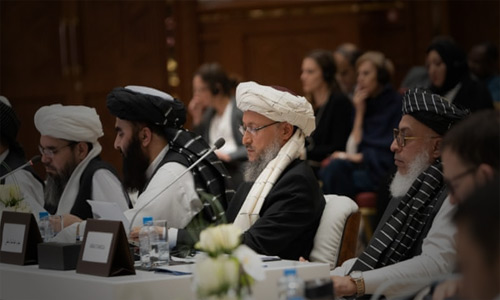It is said that the peace agreement between Taliban and US has been finalized and both sides are supposed to sign a mutual agreement after a seven-day reduction of violence. Though the content of this agreement has not been fully disclosed, it seems different from the previous one as Taliban apparently showed more flexibility comparing to the past aborted agreement. According to previous position of Taliban, the Afghan national army had to be abolished, the Islamic Emirate had to be revived and the government of Afghanistan had to be sidelined but the latest developments in the peace process seems different. During the Munich international security conference, Mr. Pompeo and Defense Secretary Mark Esper said with Afghan President Ashraf Ghani that Taliban became ready to stop fighting and acknowledge a pluralistic society, according to a statement from Ghani’s office. Therefore, Ghani is to launch consultations with different sections of society to discuss about the details of developments and talk about opportunities and risks for peace. Given the above mentioned points, the US-Taliban Agreement and new changes in Taliban position seems a good step towards sustainable peace in the country. Nevertheless, considering the root causes of Afghanistan’s conflict and reaching to national and international consensus serious efforts need to be made in the next steps. At this step, if the regional stakeholders are concerned about Afghanistan’s security issue and seek to support the Afghan peace process, they have to take more practical steps. In fact, it is a golden time for regional actors to stop void promises and aimless talks and use their leverage and power to end the conflict. The national and international consensus are key to ensuring lasting peace in the country and if the negotiation sides fail to establish such consensus, then the peace talks would bear no positive result and the country would continue to face bloodshed. Therefore, all stakeholders are expected to do their best for reaching a sustainable deal that can benefit Afghanistan, the region and beyond. What is more important for Afghan people and government is to protect from the democratic achievement and current freedom. In the other word, the current conflict in Afghanistan is not only being fought on the battlegrounds, but also presents as a political rivalry over regime type between the government and the Taliban. The government emphasizes extending the political system that emerged in the aftermath of the 2001 U.S. presence, which is theoretically based on electoral democracy, to the post-conflict Afghanistan. This means the government and its partners seek to maintain the current electoral system as the main mechanism for the distribution and balance of power. Furthermore, the government with referring to the constitution is the sovereign authority in the country and directly elected by the people and therefore represents the nation.
On the other hand, the Taliban broadly presents their Islamic Emirate brand, which is principally a closed autocracy ruled by specific interpretation from Islamic laws, as “the Islamic solution” to the country’s problems. The group, highlighting the government’s ineffectiveness in both governance and law enforcement in the past two decades, advertises its Islamic emirate as a religious-political entity that represents God’s sovereignty on earth and therefore an acceptable rule for the Muslim nation. So, without an agreement on type of political system between the two parties, reaching a political settlement to end the conflict seems out of reach.
Principally, the people’s decision and public-will must be criteria for ending this complexity. Therefore, it is important to ask which regime type the people of Afghanistan want. According to a survey which recently carried out in 34 provinces of the country by the Afghan Institute for Strategic Studies, over 68 percent of respondents prefer the post-2001 political system compared to the Taliban’s Islamic Emirate. Over 80 percent of these respondents say they support and endorse the legitimacy of a political regime where the head of the state and the country’s leaders are directly elected by the people in a free and fair election. Over 80 percent of these respondents also support elements of a democratic regime such as women’s rights and liberties, social equality, and freedom of expression.
Based on the survey, the people of Afghanistan support an electoral democracy and refuse the Taliban’s Emirate. It also challenges the conventional wisdom that suggests democratic values and processes are alien to and not supported by the people of Afghanistan. It seems that the democratic challenges, on the one hand, and the growth of the Taliban, on the other, are the real causes of distance between people and the electoral government. The new survey also shows that the past two decades of practicing democracy through voting, media, and civil society activities have significantly influenced people’s political choices. Despite the post-2001 political system’s inability to produce an effective government, the people still prefer it to the Taliban’s Emirate. By and large, the peace talks between the Taliban and the US are expected to reach a conclusion soon an “intra-Afghan dialogue” between the Taliban and government commence. The Afghan people’s preference of political regime adds a significant variable to the process. Therefore, it is important for the government, the Taliban, and the United States’ envoy for the Afghanistan peace process, Zalmay Khalilzad to include the public’s views as an important element in the talks. Including the people’s views could provide a common platform for reaching an agreement on regime type as a requirement of achieving a political settlement of the conflict.
Home » Opinion » The US-Taliban Agreement: A Good Step towards Peace in Afghanistan
The US-Taliban Agreement: A Good Step towards Peace in Afghanistan
| Mohammad Zahir Akbari

